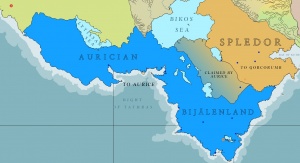Bijälenland

The Aurician colony of Bijälenland lies along the southern coast of Orrhymby, including about half of the Madzionassa Mountains and much of the Tizalassa Plateau. Portions of the Bikos Sea and the Lytissan Sea are in the colony. the greatest wetland is the Bikosal Marsh south of the Bikos Sea and the largest woodland is the Ersercean Forest, named after Ersercea Bijäl, the eldest daughter of Stalcast Bijäl and Mekarna Ullingama of-Bijälian. It shares boundaries with Spledor and Kharkhom. A contested territory lies between Bijälenland and Spledor which is known to be rich in panox. At present, hostilities between the two colonial powers have been all but eliminated due to an ongoing truce. Bijälenland is intermittently at war with the Empire of Kharkhom. The military of Bijälenland and of Merethaia coordinate actions against the orcish empire.
Bijälenland has a tropical to semi-tropical climate and is prone to cyclonic storms. Tropical spices and other crops are cultivated in the colony. The mountains of Bijälenland are rich in metallic resources and in panox, a strategic mineral for titancraft. The ongoing conflict between Gorcorumb and Aurice is due to the control and mining of these important resources.
The human inhabitants of Bijälenland come diverse origins, almost exclusively from the Pallathantic Region, especially Pytharnia, Medibgö, Thrace, Ithatia, Corundy, and Throvy. The official language of the over-provincial government is Throvian, but numerous other languages are spoken in smaller towns and households. Bijälenland is also home to several native humanlikes, including gishak, axmandel, and half orcs. Bijälenland has also been settled by halflings and quirth. The Bikosal Marsh is home to lizardfolk.
History
The southern end of Orrhymby was settled by Thracian, Medibgóëse, and Pytharnian colonists in the twenty fifth century. During the twenty fifth and twenty sixth centuries, numerous human colonies arose along the coast. With the discovery of panox in the mountainous regions, Gorcorumb established a colony north of Bijälenland in the late twenty fifth century which is now called Spledor. The human colonists fought to defend their colonies from the geddamin and from orcish raids from Kharkhom to the north. Lesser conflicts with gishak, axmandel, lizardfolk, and ogres also kept the humans continually vigilant. The colonists accepted Thracian leadership, especially in military matters in the twenty fifth century, although several appointed military governors were Medibgóëse to organize and defend against they humanlike incursions and enable further expansion into the interior of the continent. In the mid twenty fifth century, the colonies were officially annexed as part of the New Kalikán Empire and placed under a single military governor. Most colonists hesitantly accepted the leadership. Those who opposed were executed or expatriated. The Kalikán-Ephysgæes Pact ensured that all hostilities between the Gorcorumbese and the human colonists ceased.
In 2582, Stalcast Bijäl appointed Baron Midrethgourn Dio as Lord Governor-General and dispatched him with a small but capable force of enlisted Thracians to claim the colony for the Aurician. He declared that the colonies would be internally autonomous. He increased defenses against the Gorcorumbese and organized military strongholds in the western coast of the colony against orcish Kharkhom. Dio oversaw several successful campaigns against the orcs, ensuring general security and gaining the confidence of the colonists.
In 2593, Grand Duke Vast Bijäl enforced a program of renewed colonization for the south Orrhymbyne colony by sending additional colonists, military forces, establishing titancraft and other industries. Many enlisted veterans of the Fifth Geddamin War were given rights to claim tracts of land to cultivate grain and spices. Most importantly, the various colonies were granted local parliaments with many powers to regulate their own taxation. In 2594, with the approval of the Noble Senate, the southern colony was renamed Bijälenland after Stalcast Bijäl. In 2604, Rhungast Bijäl renewed colonization of Bijälenland as part of a program to establish his new regime.
In 2691 to 2694, the dissatisfaction of many colonists resulted in the Bijälenlander Uprising which was crushed and diffused by the colonial authorities in cooperation with several corpora mercia. Several reforms have been ongoing since that time to address the grievances of the colonists.
See Also
- Bijälenlander Uprising, 2691 to 2694
- Kharkhom
- Orrhymby
- Spledor
| This article is a stub. It requires further development by the creator. |